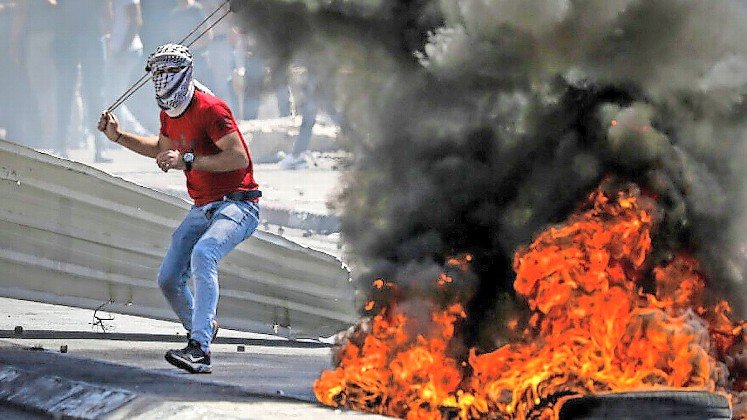Israeli security threats just keep on coming
The Israeli security establishment has received dozens of concrete alerts about plots to carry out terrorist attacks, both in Judea and Samaria and within the Green Line, a former defense official tells JNS.
Col. (res.) David Hacham, a senior research associate at the MirYam Institute and a former adviser on Arab affairs to seven Israeli defense ministers, added that the March 13 roadside bombing by a terrorist who infiltrated Israel from Lebanon reflects an effort “to connect the arenas of conflict” — Lebanon and Judea and Samaria — likely by a coalition of Lebanese and Palestinian terrorist organizations.
“It seems the attack was initiated by elements of Hezbollah and Hamas, and perhaps by others,” said Hacham. “There is a desire here to integrate arenas of conflict against Israel. And I also link the attack to the domestic situation, the crisis gripping Israel [regarding the government’s judicial reform program]. Terrorist organizations view the crisis as an opportunity to take advantage of and attack.” “They see that Israel is busy now and they perceive it as weakened.”
Addressing Sunday’s regional summit in Sharm el-Sheikh, Egypt, which was designed to secure a de-escalation of the Israeli-Palestinian conflict, Hacham said the talks were “divorced from the reality on the ground.”
Officials from Israel, the Palestinian Authority, Egypt, Jordan and the US met in the Sinai resort.
Jerusalem was represented by Israel Security Agency (Shin Bet) director Ronen Bar and National Security Council head Tzachi Hanegbi. The Palestinian delegation was led by PA Civil Affairs Minister Hussein al-Sheikh and General Intelligence Service chief Majed Faraj.
Brett McGurk, National Security Council coordinator for the Middle East and North Africa, represented the United States, alongside Jordanian Foreign Minister Ayman Safadi and Egyptian Foreign Minister Sameh Shoukry.
Hacham said that despite the positive images, a large gap remains between the discussions and “the situation on the ground.”
During the summit, Israel reportedly agreed to freeze construction in Judea and Samaria for four months and to stop recognizing unauthorized outposts for six months. The PA reportedly committed to implementing its “legal right” to carry out security responsibilities in Area A of Judea and Samaria, where the great majority of the Palestinian population is located.
The sides also reportedly created a forum to further discuss Palestinian demands to receive tax funds that Israel has withheld after deducting the equivalent of the monthly stipends paid to terrorists.
“The PA is struggling to impose its authority on the ground. Agreements reached will not be worth the paper they were written on,” Hacham assessed.
Looking ahead, Hacham warned that with Ramadan set to start on Wednesday or Thursday night, what is already an escalation in Palestinian violence could get significantly worse.
He connected the period with religious emotions as well as deliberate incitement, especially from Hamas officials in the Gaza Strip, through the media and social networks.
“When combined, these elements are an almost certain prescription for a security deterioration and escalation,” Hacham warned.
“It is important to emphasize that according to extreme scenarios, the escalation trend could spread to the Gaza Strip and the Arab sector in Israel. These problematic scenarios must be taken seriously by the senior security and political echelon, and require Israel to prepare for them,” he said.
The Ramadan month is characterized by fasting from sunrise to sunset, creating feelings of ongoing pressure for some who observe it, and this could motivate potential attackers to more easily take part in violence against Israeli targets, according to Hacham. “In this state, any incident can push potential attackers into striking,” he said.
“In practice, we are beyond the stage of escalation in the conflict with the Palestinians. Every event has a major significance; it can lead to yet more escalations.”
The Israeli Defense Ministry’s unit for Coordination of Government Activities in the Territories (COGAT) meanwhile announced on Monday steps to facilitate Ramadan festivities.
COGAT said measures reflect “recommendations of the security services and are intended to provide freedom of worship for the Palestinian public.”
The measures include approving the entry of Palestinian worshippers onto the Temple Mount for Friday prayers during the month of Ramadan, but with restrictions for security purposes.
“Females of all ages, and boys to the age of 12, may enter with no need for an existing permit. Men 55 years of age and older may enter without a permit, and men 45 years of age and older, but less than 55, may enter provided they have a valid permit. All permits are contingent on receipt of security approval,” said COGAT.
“Also for Ramadan, visits to family in Israel have been approved for Palestinian residents of Judea and Samaria, as well as visits to relatives in Judea and Samaria by residents of foreign countries. We emphasize that issuance of all permits is subject to security approval,” it added.
Ultimately, said Hacham, of the three options available regarding the future of Judea and Samaria: strengthening the PA to enable it to continue to rule there; a Hamas takeover; and a return of the area to Israeli direct control, the first is the one that is aligned with Israel’s core security interests.
Israel should manage future events with this strategic reality in mind, he said.

 50.0°,
Overcast
50.0°,
Overcast 




